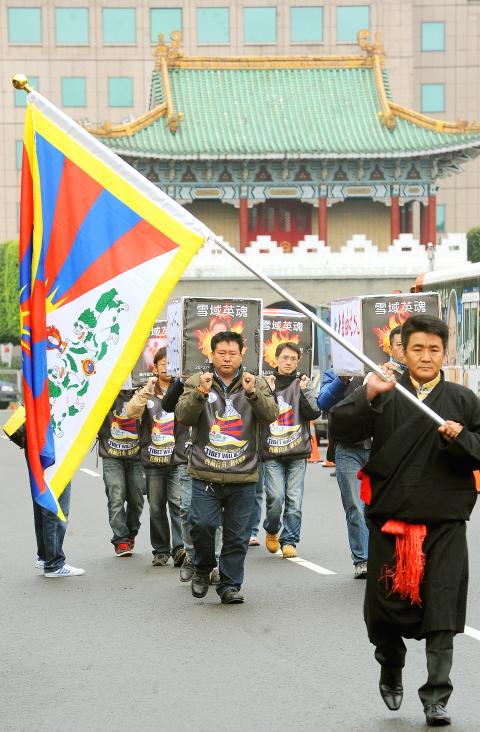Carrying model coffins and singing the Tibetan national anthem, dozens of Tibetans and Taiwanese supporters of Tibetan independence yesterday marched along Ketagalan Boulevard in Taipei and submitted a petition urging President Ma Ying-jeou (馬英九) to pay more attention to the state of human rights in Tibet.
The activists, who carried the cardboard coffins to symbolize the 28 self-immolations by Tibetans since March last year amid a renewed clampdown by Chinese authorities, condemned the Chinese government for its continuous repression of Tibet and reminded Ma of his previous promise to take an interest in human rights issues in the region.
“President Ma voiced his support for Tibet’s struggle for freedom when running for president in 2008. However, since then, he has not openly shown his support. Taiwan’s closer economic ties with China should not prevent our government from taking a strong stance on human rights in Tibet,” Taiwan Friends of Tibet deputy director Yiong Cong-ziin (楊長鎮) said.

Photo: Liu Hsin-de, Taipei Times
Amnesty International Taiwan board member Tashi Tsering, an Indian-born Tibetan-Taiwanese, said Tibetans had been fighting for religious freedom and their human rights in a peaceful way and that people were setting themselves on fire because the situation in the region had become unbearable.
“We need to defend our right to religious freedom and ask for the return of [Tibetan spiritual leader] the Dalai Lama,” he said.
“The fight for freedom and human rights in Tibet is not only for Tibetans ... the international community should join us in asking for change in China,” he said.
Police and security guards carefully monitored the group as it later marched from the Taipei Guest House to the Presidential Office to hand over a petition to Ma, calling on him to pay attention to human rights.
A staff member from the Presidential Office’s public relations division received the petition and promised to relay the group’s concerns to Ma.
Ma, who had expressed sympathy for Tibet’s independence movement during the 2008 presidential campaign, rejected a proposal later that year, after he had been elected, for the Dalai Lama to visit the country.
Yang Cheng-shin (楊正欣), a member of Taiwan Students for a Free Tibet, said the group hoped that the president would openly voice his concerns about China’s human rights situation and hold regular meetings with civic groups and human rights advocates to monitor the state of human rights in Tibet.
The group also invited the public to join a rally today in commemoration of the 52nd anniversary of the 1959 Tibetan uprising. The rally is scheduled to begin at 2pm in front of Zhongxiao Fuxing MRT Station.

Several Chinese Nationalist Party (KMT) officials including Chairman Eric Chu (朱立倫) are to be summoned for questioning and then transferred to prosecutors for holding an illegal assembly in Taipei last night, the Taipei Police said today. Chu and two others hosted an illegal assembly and are to be requested to explain their actions, the Taipei City Police Department's Zhongzheng (中正) First Precinct said, referring to a protest held after Huang Lu Chin-ju (黃呂錦茹), KMT Taipei's chapter director, and several other KMT staffers were questioned for alleged signature forgery in recall petitions against Democratic Progressive Party (DPP) legislators. Taipei prosecutors had filed

Taiwan would welcome the return of Honduras as a diplomatic ally if its next president decides to make such a move, Minister of Foreign Affairs Lin Chia-lung (林佳龍) said yesterday. “Of course, we would welcome Honduras if they want to restore diplomatic ties with Taiwan after their elections,” Lin said at a meeting of the legislature’s Foreign Affairs and National Defense Committee, when asked to comment on statements made by two of the three Honduran presidential candidates during the presidential campaign in the Central American country. Taiwan is paying close attention to the region as a whole in the wake of a

NEW WORLD: Taiwan is pursuing innovative approaches to international relations through economics, trade and values-based diplomacy, the foreign minister said Taiwan would implement a “three-chain strategy” that promotes democratic values in response to US tariffs, Minister of Foreign Affairs Lin Chia-lung (林佳龍) said. Taiwan would aim to create a “global democratic value chain,” seek to capitalize on its position within the first island chain and promote a “non-red supply chain,” Lin was quoted as saying in the ministry’s written report to the Legislative Yuan submitted ahead of the legislature’s Foreign Affairs and National Defense Committee meeting slated for today. The Ministry would also uphold a spirit of mutual beneficial collaboration, maintaining close communication and consultations with Washington to show that Taiwan-US cooperation

Taiwan and the US have begun trade negotiations over tariffs imposed by US President Donald Trump earlier this month, Minister of Foreign Affairs Lin Chia-lung (林佳龍) said in an interview this morning before reporting to the Legislative Yuan’s Foreign Affairs and National Defense Committee. The Taipei Economic and Cultural Representative Office (TECRO), Taiwan’s de facto embassy in the US, has already established communication channels with the US Department of State and the US Trade Representative (USTR), and is engaging in intensive consultations, he said. Points of negotiation include tariffs, non-tariff trade barriers and issues related to investment, procurement and export controls, he